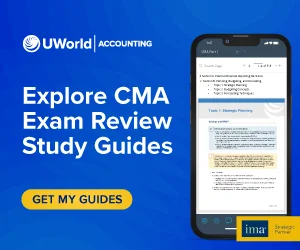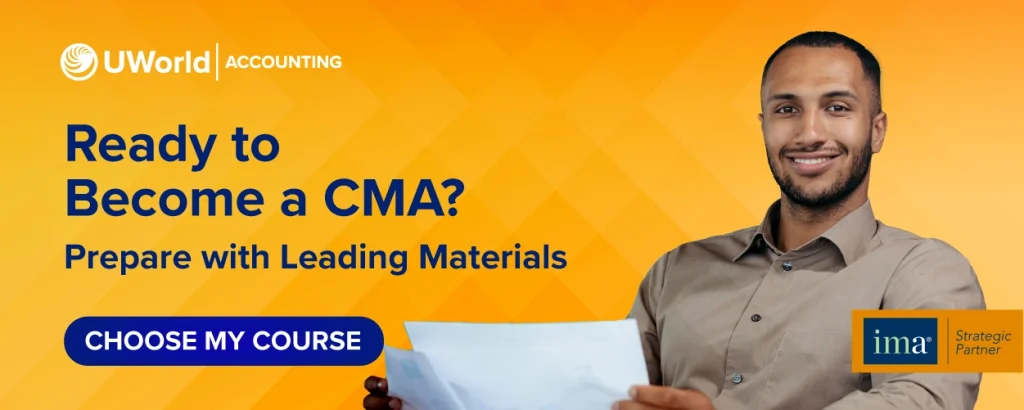Earning your Certified Management Accountant (CMA) certification is the golden ticket to countless professional accounting and finance opportunities. However, studying for the exam while juggling other responsibilities can feel unmanageable.
With the right strategies and a focus on maintaining a healthy work-life balance, you can ace your exam, thrive in your career, and still enjoy a fulfilling personal life.
Optimizing CMA Study Sessions
Excelling on the CMA exam requires consistent dedication and strategic preparation, but it is possible. At first, the hundreds of study hours recommended by Institute of Management Accountants (IMA) may feel daunting. However, using strategies and tools that ensure retention-boosting study can help you make every minute count, giving you time back in other areas of your life.
Create a Reliable Study Schedule
A well-organized, thoughtful study schedule is the non-negotiable backbone of CMA preparation. To create your own CMA study schedule, write down your other commitments and identify the most important ones. Setting realistic expectations upfront about which commitments to keep and let go of will help you avoid overloading yourself and burning out later.
IMA recommends you allocate 150-170 hours for each of the exam's 2-parts, spread over 16 weeks. This translates to 8-10 hours of study per week. Consider your other commitments, and decide how and when you allocate these hours, understanding that this schedule can be adjusted down the line.1
Plan a mix of short and long study sessions each week. Include shorter intervals, such as 15-minute micro sessions, and longer 1-3 hour sessions for deep focus.
Try our customizable planner that tailors a CMA study plan to your schedule.
Adjust Your Study Routine Based on Progress
To improve the quality of your study sessions, don't stick to a single, stagnant study plan the entire time. Create a malleable plan that can be altered as you master or struggle with particular subjects.
Invest in high-quality digital learning tools to help you identify your strengths and weaknesses, enabling you to focus on subjects that need improvement and spend less time on the ones that don't. These tools provide valuable insights into how well you've mastered specific topics, guiding your next steps and helping you alter your study plan according to your progress.
Keeping an improvement journal is another useful strategy for monitoring your progress. Document challenging concepts and revisit them periodically to reinforce understanding. Combining these approaches ensures that your preparation evolves with your progress, helping you stay on track for CMA success.
Target Your Study to the CMA Content Specification Outline
While all CMA content is valuable, not all content is created equally. The key to optimizing each of your study sessions is to avoid wasting time on subjects that aren't tested as heavily.
Do this by curating a study plan that is targeted to reflect the exam's most heavily weighted content. This way, you aren't wasting precious study time on extraneous material.
The CMA exam has 2 parts, each with a specific focus and weighted topics. Tackle these highly weighted content areas before moving on to less essential content.
For Part 1, prioritize these subjects first:
- Planning, Budgeting, and Forecasting (20%)
- Performance Management (20%)
For Part 2, prioritize these subjects first:
- Business Decision Analysis (25%)
- Financial Statement Analysis (20%)
- Corporate Finance (20%)
By focusing on the above areas, you've knocked out about half of both exam parts (40% of Part 1 content and 60% of Part 2 content). Conquering this robust exam material upfront prepares you more efficiently and boosts morale.
Use our 6-month CMA study plan, targeted to the exam blueprint.
Leveraging the Workplace
After a full day of work, coming home and studying nonstop might feel impossible — and you're right. This approach leads to burnout. Instead, shift your mindset and think about how you can use your time at work to your advantage.
Here are some practical ways to maximize your time on the job — because advancing your career is likely one of the main reasons you're pursuing CMA certification in the first place.
Ask Your Employer for Support
Your employer can be a pivotal partner in your CMA journey if you allow them to be. Schedule a meeting with your supervisor or HR department to discuss your goals, explain how earning the CMA certification benefits the organization, and explore the support your company or firm can provide. Highlight the skills you'll gain, such as strategic decision-making and advanced financial management, and how these can directly contribute to company success.
Don't hesitate to request flexible work arrangements or financial assistance for exam fees and study materials. Many employers have professional development budgets and happily support certifications such as the CMA for their employees.
Propose a clear plan outlining your study schedule, preparation needs, and how you'll manage work responsibilities during this time. If you ask directly, you might be surprised at the resources and connections available. Involving your employer in your journey aligns your goals with organizational objectives, creating a mutually beneficial partnership.
Implement Micro-Learning Strategies
Optimize opportunities for micro-learning to avoid cramming long study sessions during precious downtime hours. Consider using your commute to listen to CMA lectures or practice recalling key concepts.
Mobile apps with flashcards or quick quizzes are great for brief study sessions during breaks or idle moments in the elevator or commute. Incorporating short, focused sessions into your routine helps you maintain steady progress without studying around the clock.
Explore our UWorld Accounting - Exam Prep mobile app for on-the-go learning.
Network in the CMA Community
CMA certification is an esteemed credential that connects you to a global community of accountants and financial professionals. Your company is not the only resource you have for connections and support.
Seek networking opportunities to connect with accounting professionals who have been in your shoes and may have industry-specific advice about the CMA certification process. These events offer workshops and keynote speakers to guide and motivate you as you prepare for exam day.
Key events for CMA certifying professionals:
- IMA Annual Conference and Expo: This prominent event draws more than 800 attendees and features educational workshops and valuable networking opportunities.
- Local IMA chapter events: These gatherings offer Continuing Professional Education (CPE) credit programs, mentorship opportunities, and community service initiatives.
- CMA-specific webinars offered by universities: Many universities with esteemed accounting and finance programs host open webinars. Contact a specific educational institution to learn more.
- American Institute of Certified Public Accountants (AICPA) events: AICPA organizes several conferences, including the widely attended AICPA ENGAGE, which brings together over 4,000 accounting and finance professionals from varied backgrounds.
Online platforms including LinkedIn also offer opportunities to join discussions, share experiences, and build relationships with others. Networking enhances your CMA study experience and lays the groundwork for future career opportunities in accounting and finance.2
Balancing Other Aspects of Life
Your life doesn't pause when you begin studying for the CMA. Maintaining a healthy balance between CMA preparation, work, and personal responsibilities requires acknowledging and prioritizing the other important aspects of your life that still need your attention — and embracing them.
By making time for your physical health, mental well-being, and social connections, you'll allow yourself to recharge and approach your studies with renewed energy and focus. Neglecting these areas can lead to fatigue, decreased productivity, and unnecessary stress.
Remember that the CMA is just one part of your journey. By nurturing all aspects of your life, you'll be better equipped to stay motivated, handle challenges, and bring your best self to the exam and your career.
Prioritize Your Physical Health
Your physical health is critical to successful exam preparation. Regular exercise, proper nutrition, and adequate sleep contribute to enhanced focus, better information retention, and sustained energy levels during study sessions.3
Healthy habits to adopt:
- Incorporate regular exercise: You don't have to run a marathon. Take short walks, do desk stretches, or stand while reading to stay active between study sessions.
- Maintain a balanced diet: Eat nutritious meals that fuel your brain, including foods rich in omega-3 fatty acids, antioxidants, and complex carbohydrates.
- Stay hydrated: Fill a water bottle at the beginning of each study session and try to finish it before you finish your session.
- Prioritize sleep: Resist the urge to sacrifice rest for study. Aim for 7-8 hours of quality rest each night to ensure memory consolidation and recovery.
- Take regular breaks: Follow the "45/15" rule — study for 45 minutes, then take a 15-minute break to stretch, move, or do light exercises.
Lean on Your Social Network
While it's true that your social priorities may shrink during this focused study period, cutting them out entirely isn't in your best interest. Avoid the urge to neglect your social circle to study more.
Instead, pay attention to how many people want to support you on your CMA journey. Let them know why the CMA certification is important to you, how it will impact your time and energy this season, and how they can help you stay sane and fulfilled.
Tell your friends and family that you'll be busier than usual during this time. Being upfront about your schedule helps them understand your availability and makes your time together more meaningful. When you can spend time with loved ones, step away from the CMA and be fully present. Taking this break from studying will help you recharge and return to your preparation with renewed energy and sharper focus.
Regular social interactions, especially face-to-face interactions, offer emotional support, help you avoid feelings of isolation, and give you a much-needed mental break from intense study schedules. By prioritizing meaningful engagement with others, you can recharge, share challenges, build resilience, and feel less alone as you navigate this challenging certification process.4
Take Care of Your Mental Health
Tending to your mental health matters when studying for an exam as rigorous as the CMA. Incorporating habits such as mindfulness, journaling, and visualization can help you manage stress, build confidence, and maintain focus during your studies.
Mental health strategies to adopt:
- Practice relaxation techniques: Try deep breathing, meditation, or other stress-relief methods to maintain mental clarity.
- Engage in activities you enjoy: Set aside time for hobbies or interests you love to maintain balance during CMA study.
- Schedule "worry time": Allocate a specific time each day to address exam-related concerns so anxiety doesn't spill over into other parts of your day.
- Visualize exam success: Spend a few minutes imagining yourself confidently answering questions and performing well on exam day to build self-assurance and reduce stress.
- Journal regularly: Write down your thoughts or goals to process feelings and track your progress as you prepare.
A balanced approach to mental health will help you stay motivated and avoid burnout as you work toward becoming a CMA-certified professional.
References
- I Pass the CMA Exam. (n.d.). CMA exam prep tips. Retrieved from https://ipassthecmaexam.com/cma-exam-prep-tips/
- Future Firm. (n.d.). Accounting conferences. Retrieved December 10, 2024, from https://futurefirm.co/accounting-conferences/
- PMC. (n.d.). Self-reported quantitative data indicated enjoyment and enhanced peer engagement. Retrieved from https://pmc.ncbi.nlm.nih.gov/articles/PMC11027499/#:~:text=Self%2Dreported%20quantitative%20data%20indicated,enjoyment%2C%20and%20enhanced%20peer%20engagement
- Faculty Wala. (n.d.). CMA exam tips and tricks. Retrieved from https://www.facultywala.com/blogs/cma-exam-tips-and-tricks
- AccountingCoach. (n.d.). Testimonials. Retrieved from https://www.accountingcoach.com/testimonials




